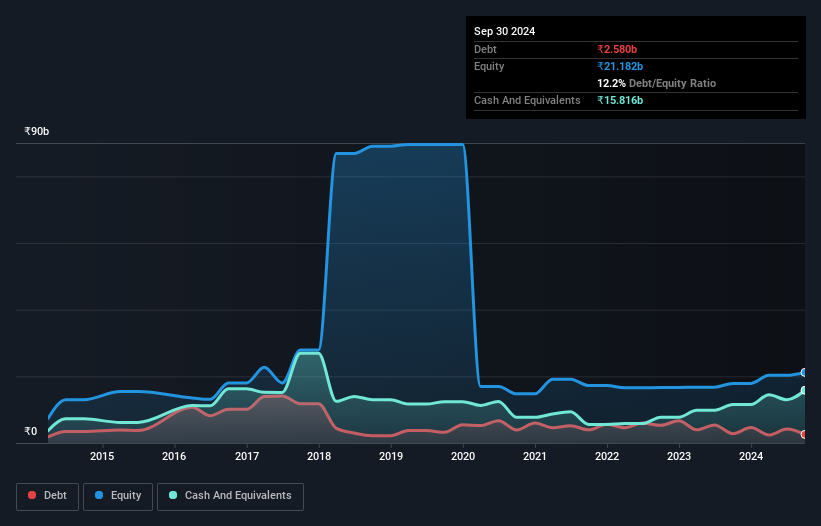- India
- /
- Hospitality
- /
- NSEI:THOMASCOOK
Thomas Cook (India) (NSE:THOMASCOOK) Has A Rock Solid Balance Sheet

The external fund manager backed by Berkshire Hathaway's Charlie Munger, Li Lu, makes no bones about it when he says 'The biggest investment risk is not the volatility of prices, but whether you will suffer a permanent loss of capital.' It's only natural to consider a company's balance sheet when you examine how risky it is, since debt is often involved when a business collapses. We note that Thomas Cook (India) Limited (NSE:THOMASCOOK) does have debt on its balance sheet. But the more important question is: how much risk is that debt creating?
When Is Debt A Problem?
Debt assists a business until the business has trouble paying it off, either with new capital or with free cash flow. If things get really bad, the lenders can take control of the business. However, a more frequent (but still costly) occurrence is where a company must issue shares at bargain-basement prices, permanently diluting shareholders, just to shore up its balance sheet. By replacing dilution, though, debt can be an extremely good tool for businesses that need capital to invest in growth at high rates of return. When we think about a company's use of debt, we first look at cash and debt together.
Check out our latest analysis for Thomas Cook (India)
What Is Thomas Cook (India)'s Debt?
As you can see below, Thomas Cook (India) had ₹2.58b of debt at September 2024, down from ₹2.80b a year prior. But it also has ₹15.8b in cash to offset that, meaning it has ₹13.2b net cash.

How Healthy Is Thomas Cook (India)'s Balance Sheet?
Zooming in on the latest balance sheet data, we can see that Thomas Cook (India) had liabilities of ₹40.0b due within 12 months and liabilities of ₹10.2b due beyond that. Offsetting these obligations, it had cash of ₹15.8b as well as receivables valued at ₹8.13b due within 12 months. So its liabilities outweigh the sum of its cash and (near-term) receivables by ₹26.3b.
Thomas Cook (India) has a market capitalization of ₹86.5b, so it could very likely raise cash to ameliorate its balance sheet, if the need arose. But it's clear that we should definitely closely examine whether it can manage its debt without dilution. While it does have liabilities worth noting, Thomas Cook (India) also has more cash than debt, so we're pretty confident it can manage its debt safely.
In addition to that, we're happy to report that Thomas Cook (India) has boosted its EBIT by 43%, thus reducing the spectre of future debt repayments. The balance sheet is clearly the area to focus on when you are analysing debt. But it is future earnings, more than anything, that will determine Thomas Cook (India)'s ability to maintain a healthy balance sheet going forward. So if you're focused on the future you can check out this free report showing analyst profit forecasts.
But our final consideration is also important, because a company cannot pay debt with paper profits; it needs cold hard cash. While Thomas Cook (India) has net cash on its balance sheet, it's still worth taking a look at its ability to convert earnings before interest and tax (EBIT) to free cash flow, to help us understand how quickly it is building (or eroding) that cash balance. Happily for any shareholders, Thomas Cook (India) actually produced more free cash flow than EBIT over the last two years. That sort of strong cash conversion gets us as excited as the crowd when the beat drops at a Daft Punk concert.
Summing Up
Although Thomas Cook (India)'s balance sheet isn't particularly strong, due to the total liabilities, it is clearly positive to see that it has net cash of ₹13.2b. And it impressed us with free cash flow of ₹7.0b, being 251% of its EBIT. So is Thomas Cook (India)'s debt a risk? It doesn't seem so to us. Another factor that would give us confidence in Thomas Cook (India) would be if insiders have been buying shares: if you're conscious of that signal too, you can find out instantly by clicking this link.
Of course, if you're the type of investor who prefers buying stocks without the burden of debt, then don't hesitate to discover our exclusive list of net cash growth stocks, today.
Valuation is complex, but we're here to simplify it.
Discover if Thomas Cook (India) might be undervalued or overvalued with our detailed analysis, featuring fair value estimates, potential risks, dividends, insider trades, and its financial condition.
Access Free AnalysisHave feedback on this article? Concerned about the content? Get in touch with us directly. Alternatively, email editorial-team (at) simplywallst.com.
This article by Simply Wall St is general in nature. We provide commentary based on historical data and analyst forecasts only using an unbiased methodology and our articles are not intended to be financial advice. It does not constitute a recommendation to buy or sell any stock, and does not take account of your objectives, or your financial situation. We aim to bring you long-term focused analysis driven by fundamental data. Note that our analysis may not factor in the latest price-sensitive company announcements or qualitative material. Simply Wall St has no position in any stocks mentioned.
About NSEI:THOMASCOOK
Thomas Cook (India)
Offers integrated travel services in India and internationally.
Excellent balance sheet with reasonable growth potential.
Similar Companies
Market Insights
Community Narratives




